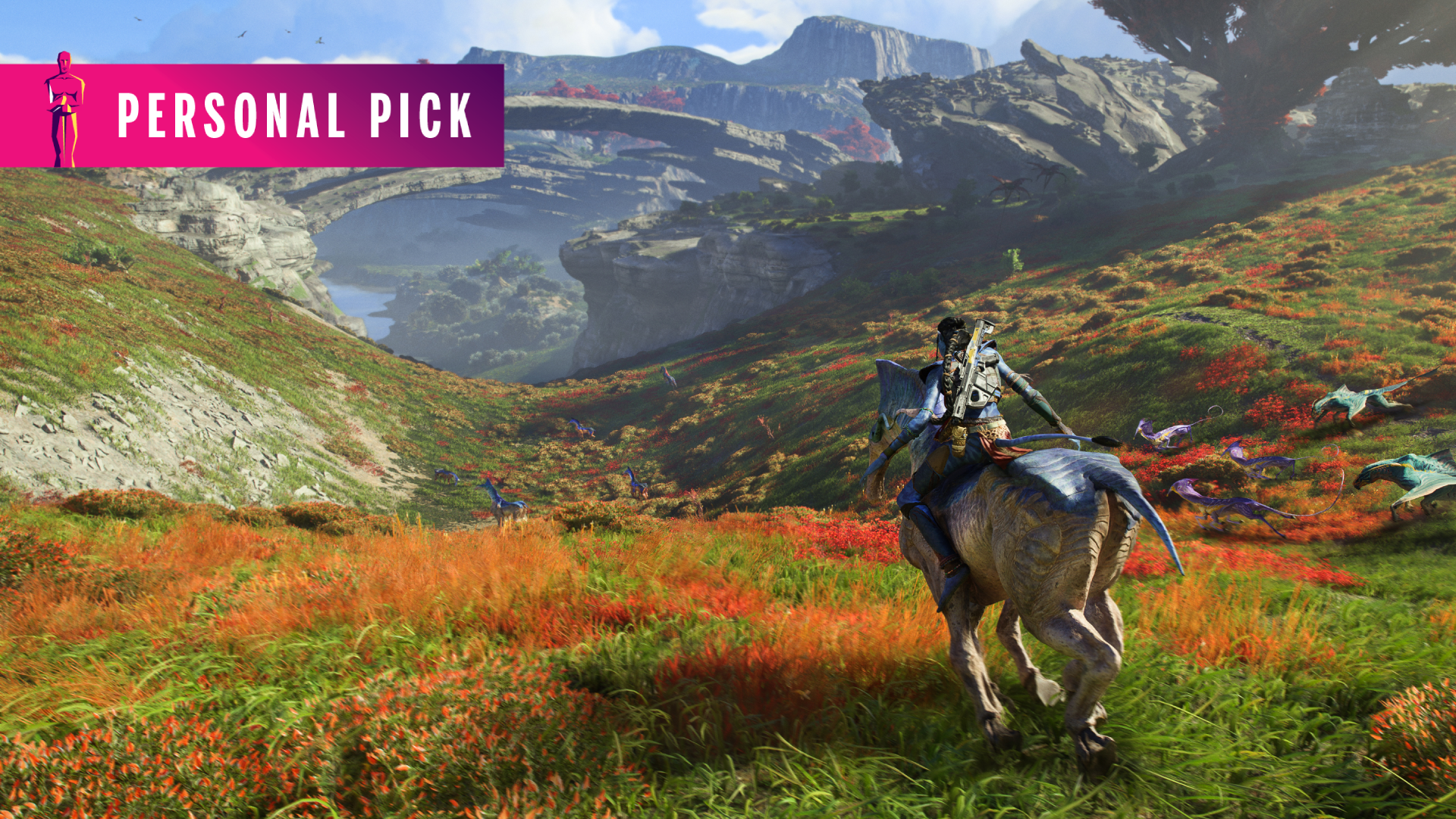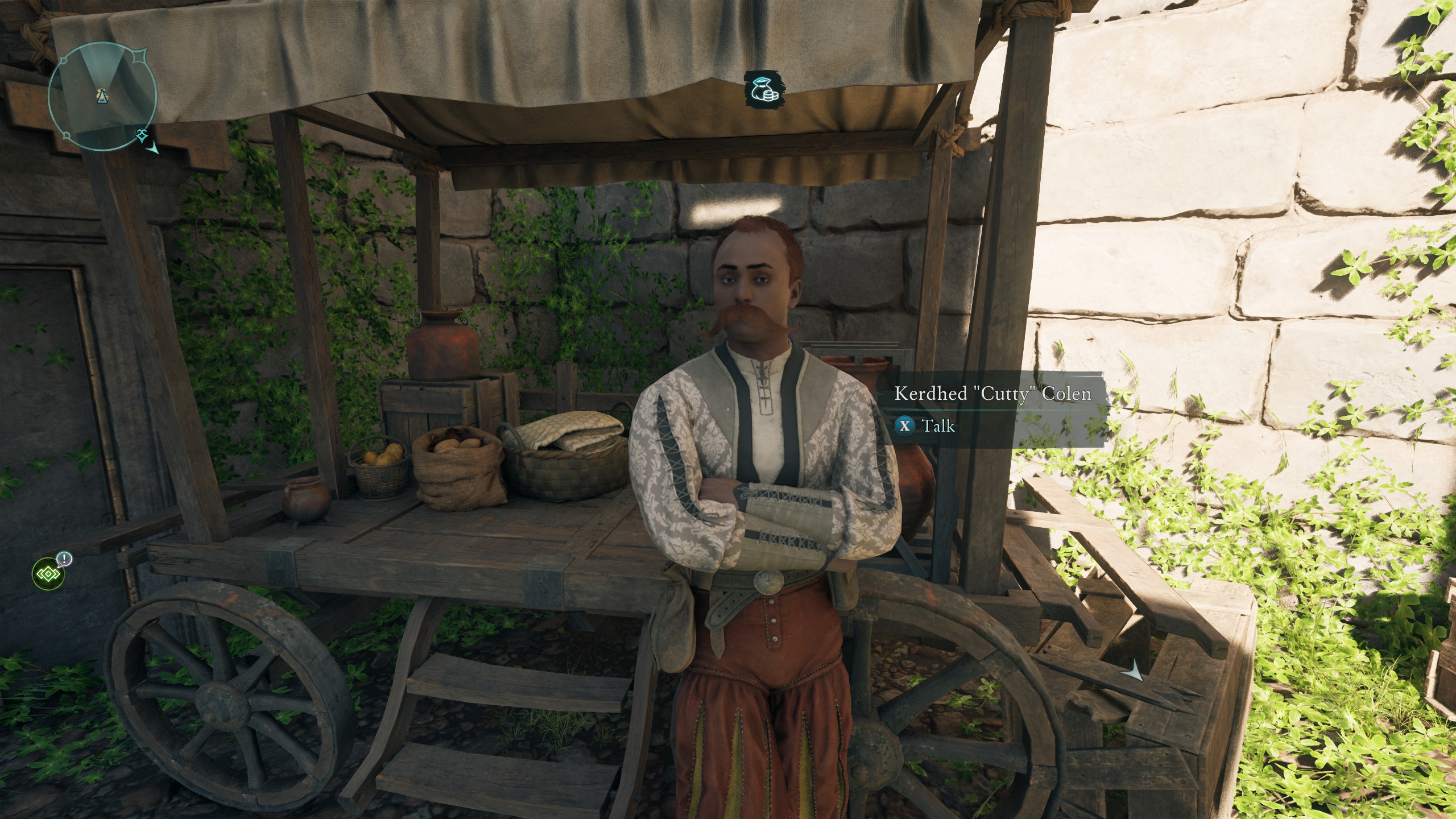I spent half of 2023 being cranky about Avatar: Frontiers of Pandora. I caught a theater demo at Ubisoft Forward in June and came away confused and disappointed that Ubi wasn’t making the Avatar Assassin’s Creed I’d been building up in my head. It seemed so obvious—you could climb up trees, ride an alien horse, stealth kill an RDA mech, all while appreciating the lanky proportions of a Na’vi from behind the back!
(Image credit: Future)
In addition to our main Game of the Year Awards 2023, each member of the PC Gamer team is shining a spotlight on a game they loved this year. We’ll post new personal picks, alongside our main awards, throughout the rest of the month.
I’m really glad Ubisoft Massive had a different idea. Frontiers of Pandora is Avatar Far Cry, but it’s also the best Far Cry game to date, and easily the best sandbox Ubi has put together in years. It feels great to have been this wrong.
It’s also great to be a Na’vi in first-person. I was worried not being able to see my blue body all the time would make me forget I’m not playing a human, but it’s the opposite. I’m reminded of my size and power every time I square up with the RDA or bonk my head on a ceiling, and I don’t think those moments would land the same way with an over-the-shoulder camera that tries to keep everything in the frame at once. I don’t always feel like a nine-foot-tall alien while running around gigantic forests, but you actually spend a good chunk of Frontiers looking down at pipsqueak humans and literally ducking under low-clearance doorways. RDA goons look like ants as they patrol around oil refineries, and their puny guns are just a nuisance in small numbers. Get close enough to punch one out and they ragdoll 20 feet forward.
Easy up
By far my biggest surprise with Avatar is how fun it is to get around. Springy Na’vi limbs come in handy for leaping ten feet in the air and clambering up gaps I’d expect to miss in other games. There’s a bounciness and grace to the movement that’s really rare to find in FPSes.
There’s a bounciness and grace to the movement that’s really rare to find in FPSes.
Running to quests is almost as fun as actually doing them because, unlike Far Cry’s natural sandboxes built for roads and cars, it takes a bit of skill to gain momentum and keep it without tripping over the dense vegetation of Pandora’s rainforests. On any given trip I’m charging leaps, timing clambers onto branches, bounding across the narrow tops of trees, breaking falls by brushing leaves on the way down, and adding aftertouch to risky jumps with a midair dash. I can think of exactly two other games that’ve made me this nimble in first-person: Mirror’s Edge and Dying Light. That’s extremely good company.
It’s worth looking both ways, too, because Ubi has stuffed its Pandora full of plants you’d recognize from the movies and dozens of other ones designed to speed you up, slow you down, or just straight up kill ya. Avatar’s version of “roads” are these gigantic vines that form elevated highways. Most of these vines are blemished with blue mushrooms that briefly boost your ground speed when you run past them. You’ll also find speed shrooms along places that Ubi expects you’ll be making a long run, like along the shore of a river, and you can chain them together to keep the effect going. They’re a brilliant touch that both guide players to the map’s major landmarks and add a bit of stimulating steering to a journey that’d otherwise be a straight line.
(Image credit: Ubisoft)
Bulbous flowers serve as jump pads to break a fall or clear a gap. Gooey green sacs can be shot to disperse poison clouds for enemies or rammed into yourself for an explosive burst of speed at the cost of some health. Take your eye off the ball and you’ll probably run into a shocky cactus that drains your stamina or scrape against a tree that sets off a series of flash bombs. I’m still in the starting regions of the game and I’m already filling up my mental notebook like a boy scout deducing which berries are safe to eat. It’s pretty sweet.
Wayfinder
Avatar also has the best incarnation of my favorite Ubisoft open world feature: Exploration Mode. Ubi has included this alternate navigation setting in a handful of games starting with Assassin’s Creed Odyssey in 2018 and more recently in Ghost Recon Breakpoint and Assassin’s Creed Mirage. The idea is to replace quest markers with detailed hints about where to find the places and things you’re looking for on your own. It’s off by default in Avatar, but I really suggest you try it out.
An arrow pointing to an enemy base, for instance, becomes “Go to the RDA facility in the Spinner’s Circle domain east of the Threaded River.” As much as I can enjoy a big readable GPS line painted on a minimap, it’s so damn satisfying to find games that trust me to rub two brain cells together and find my own way.
(Image credit: Ubisoft)
But it’s not as simple as replacing arrows with compass directions—using the right language and giving just good enough hints is a delicate tight rope for quest designers. Get too specific with directions and you have a Ghost Recon problem where you can always accurately guess where you’re being led just by glancing at the map. Avatar sidesteps this by fogging up locations you haven’t visited yet. It also avoids getting stale by writing visual details from quests into its navigation hints. In the example below, one of my hints isn’t a direction, but a visual clue to look for an island with “a large fallen log and purple trees.” Little details like that make exploration intentional and additive to the experience, and every quest I’ve done in Avatar so far is like this.
I get little rushes of excitement when a place is exactly where I thought it’d be. When Exploration Mode is at its best, it turns even the most mundane chore to track down an NPC or pick a particular fruit into a little treasure hunt.
Turned around
Avatar hasn’t quite perfected Exploration Mode, though. Sometimes I’ll be in the right place, but walk right past the person I’m supposed to find because Na’vi blend in pretty well to Pandora’s blue night skies. I’ve also wasted minutes wandering around because it can be hard to deduce what Avatar considers “northwest” when sometimes the destination is way more north than west or vice versa. In real world navigation, you’d just say a place is “north-northwest” if it’s more north than west, though having to explain that in a videogame made for a wide audience would probably be harder than it’s worth.
(Image credit: Ubisoft)
In another instance I was told to return to a named camp I’d already been to with no other instructions, but since I’d forgotten which purple dot represented that camp on the map, I had to peck through over a dozen until I randomly found the right one. These were edge cases across the 11 hours I’ve put in so far, but if navigational hang ups are a deal breaker, the default Guided mode still shows you Exploration Mode clues with the addition of a glowing marker you can always orient to.
I haven’t talked about combat in these ramblings, and that’s largely because I haven’t done that much of it. Human enemies are mostly localized to RDA facilities where you do Far Cry-style stealthy outpost captures, and those are pretty fun, but out in the jungle I’ve kept my weapons holstered unless packs of alien cougars attack.
There’s enough going on in Avatar between hunting, foraging, crafting, investigating, cooking, and wayfinding that it hasn’t needed to lean on combat as filler, at least so far. That’s cool, because I’ve had a great time just being a Na’vi and taking in the sights of the most detailed world Ubi has ever made. It didn’t land a high score with us mostly due to technical issues, but I’ve only had one crash so far. I’m happy I didn’t let 2023 slip by before giving Avatar a fair shake.










